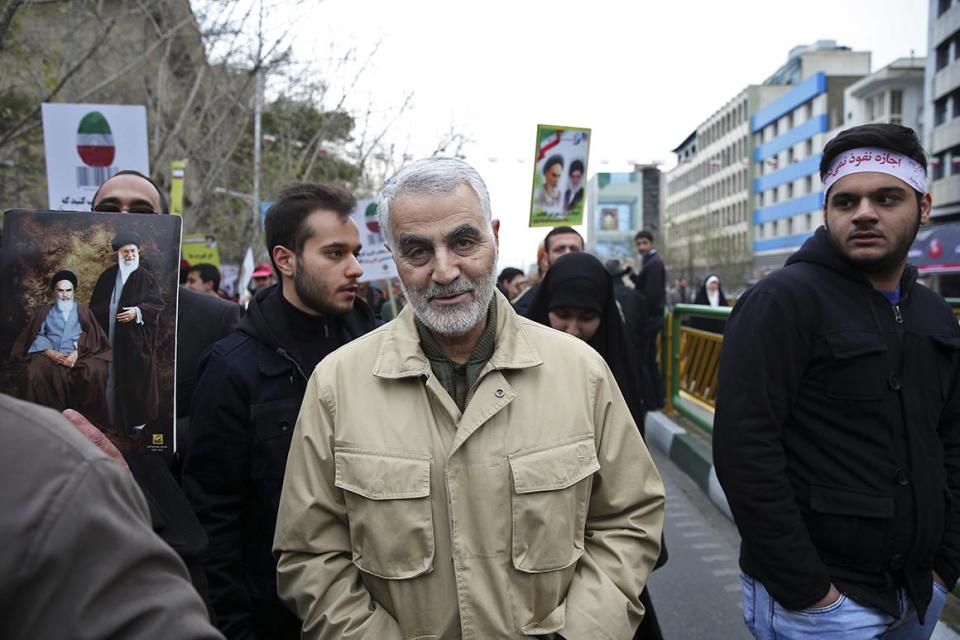Trump’s Iran strike puts 2020 primary on edge
Bernie Sanders opened his town hall in Anamosa, Iowa, on Friday with a searing rebuke of President Donald Trump’s “dangerous escalation” of the conflict in the Middle East. Joe Biden, Pete Buttigieg and Elizabeth Warren also spent their days consumed with Iran.
Less than a day after the Trump administration confirmed the killing of Qassem Soleimani, the scramble to confront the Republican president on Iran laid bare how quickly the situation had metastasized into a potentially campaign-altering development.
While nearly universally condemning Soleimani in carefully crafted statements, Democrats sought to draw subtle distinctions between themselves and their party rivals on foreign policy — for better and for worse.
Biden, the former vice president and former Senate Foreign Relations Committee chairman, leaned into his experience on the world stage at his first Iowa event Friday. Buttigieg cited his experience as a former “military intelligence officer on the ground in Afghanistan.”
Sanders reminded Democrats once again of his lonely — and politically prescient — vote against the Iraq war in 2002.
“When I voted against the war in Iraq in 2002, I feared that it would result in greater destabilization in that country and in the entire region,” Sanders said. “At that time, I warned about the deadly so-called ‘unintended consequences’ of a unilateral invasion. Today, 17 years later, that fear has unfortunately turned out to be a truth.”
Sanders, who has positioned himself to the left of the field on foreign policy, was the rare candidate not to go out of his way to assail Soleimani in prepared statements — avoiding a rhetorical two-step that could alienate interventionist-leery Democrats.
Warren failed to recognize that hazard in her initial statement, in which she called Soleimani a “murderer, responsible for the deaths of thousands, including hundreds of Americans. But this reckless move escalates the situation with Iran and increases the likelihood of more deaths and new Middle East conflict. Our priority must be to avoid another costly war.”

After progressives criticized her tone, she issued a second, more singularly Trump-focused statement Friday, and referred to the killing as an assassination of a senior foreign military official — language echoing Sanders’ earlier characterization.
The killing suddenly refocused, at least for the moment, public attention on foreign policy, which has played a minor role in a presidential primary dominated by domestic concerns.
“For most candidates, national security is a secondary issue,” said Matt Bennett of the center-left group Third Way and a veteran of Wesley Clark’s 2004 presidential campaign, noting that the moment “does feel familiar” to the political climate at the start of the Iraq war in 2003.
“If this kind of results in Iran shelling some things and doing a cyberattack that screws up somebody’s website for a while, then it won’t have any impact [on the 2020 primary],” he said. “But if Iran responds with serious force in some way — and it’s impossible to speculate what that could look like — then I think it could raise real questions about the ability of the various Democratic candidates to credibly claim national security expertise.”
Bennett said it is “blindingly obvious” that a shift in focus to national security would benefit Biden, with his extensive record on foreign policy — an opinion Biden’s campaign shares. But it will also highlight — as Sanders has — progressives’ discomfort with his 2002 vote in favor of the invasion of Iraq.
The Republican National Committee immediately seized on the Iran strike to lay into Biden. In a prepared statement, it said that if Biden were president, “Osama bin Laden would still be alive, Abu Bakr al-Baghdadi would still be alive, Soleimani would still be alive, China would be eating our lunch and Iran would be on the path to a nuke.”
Yet for Democrats, the broader concern was the reminder of Trump’s singular ability to dictate the terms of the campaign. Trump speculated repeatedly during Barack Obama’s presidency that Obama would try to exploit Iran for political gain, warning in one of several now-widely circulated tweets he “will attack Iran in the not too distant future because it will help him win the election.”
This week, it was Trump raising the specter of an escalating conflict in the Middle East and opening new battle lines in the 2020 primary.
“On the one hand, this was retaliation of the highest order, against an indisputably brutal actor in Soleimani, which may rally Americans around the commander in chief,” said David Axelrod, the former Obama adviser. “On the other, it will almost certainly be interpreted by the Iranians as an act of war, and may fetch serious and far flung consequences which could entangle the U.S. in the Middle East in new and perilous ways.”
In a victory lap Friday, Trump said Soleimani had killed or wounded thousands of Americans and “got caught” while plotting to kill more. For the Republican president, the political message was simple: Before issuing his statement, Trump had simply tweeted an image of the American flag.
“Thus far in the campaign, foreign policy has figured as little more than an afterthought” said Andrew Bacevich, the retired Army colonel and longtime professor of international relations. “The crisis with Iran, carrying with it the possibility of war, all but obliges the Democratic candidates to take a stand. The real issue is not the escalating tit-for-tat violence, but whether or not to continue in the post-9/11 project of using force to impose order on the Greater Middle East. The effort has produced no positive results. Trump promised to call it off. He has obviously failed. Will the Democrats offer something better?”
Holly Otterbein and Alex Thompson contributed to this report.

